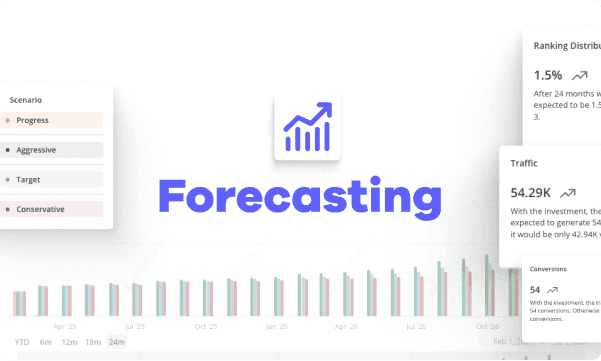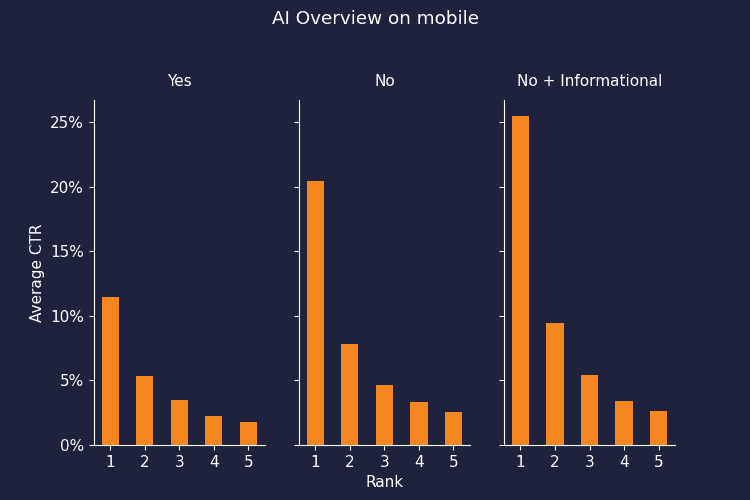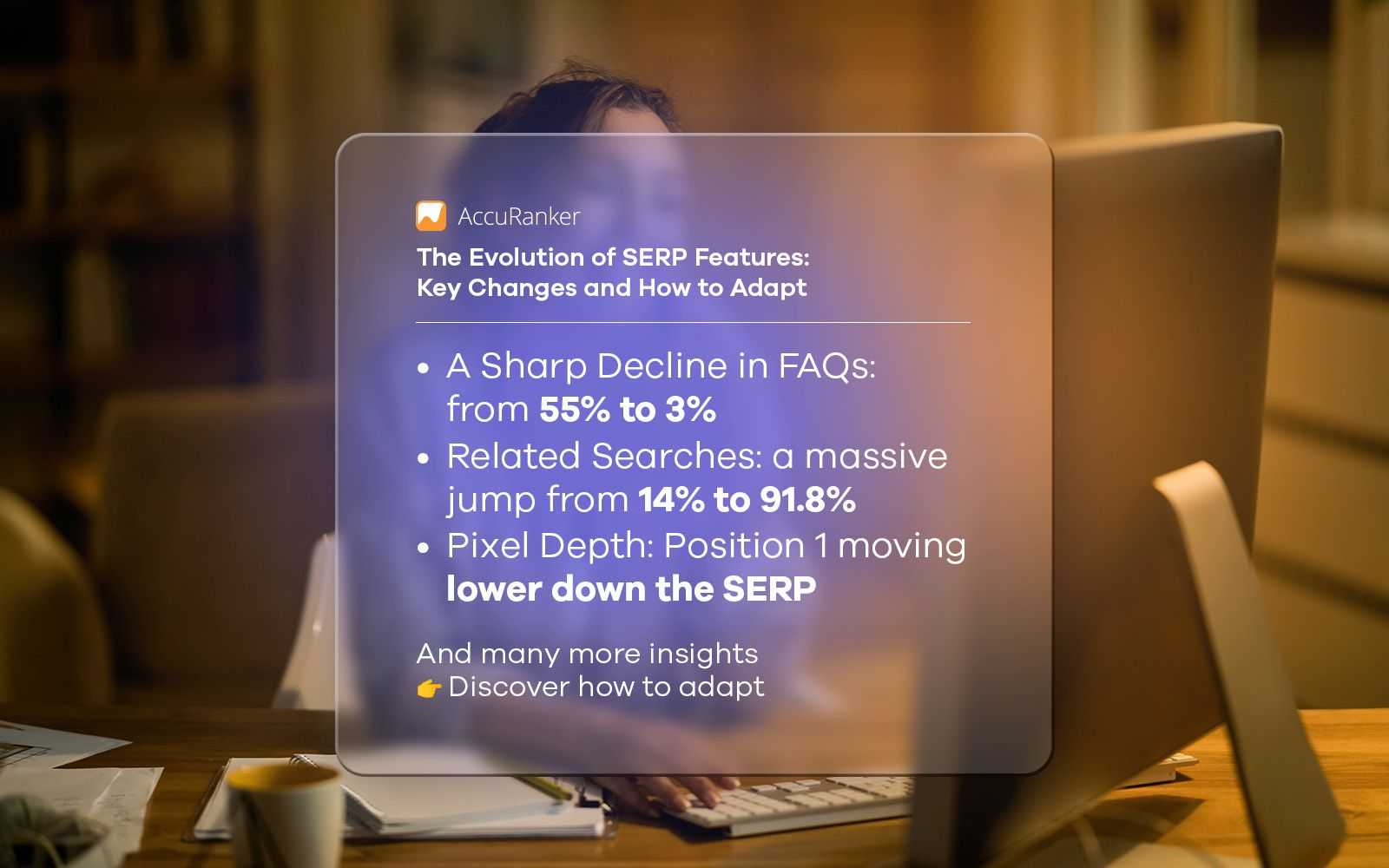AI and SEO: Embracing AI for Keyword Research and Content Optimization
Last updated on Wednesday, August 30, 2023
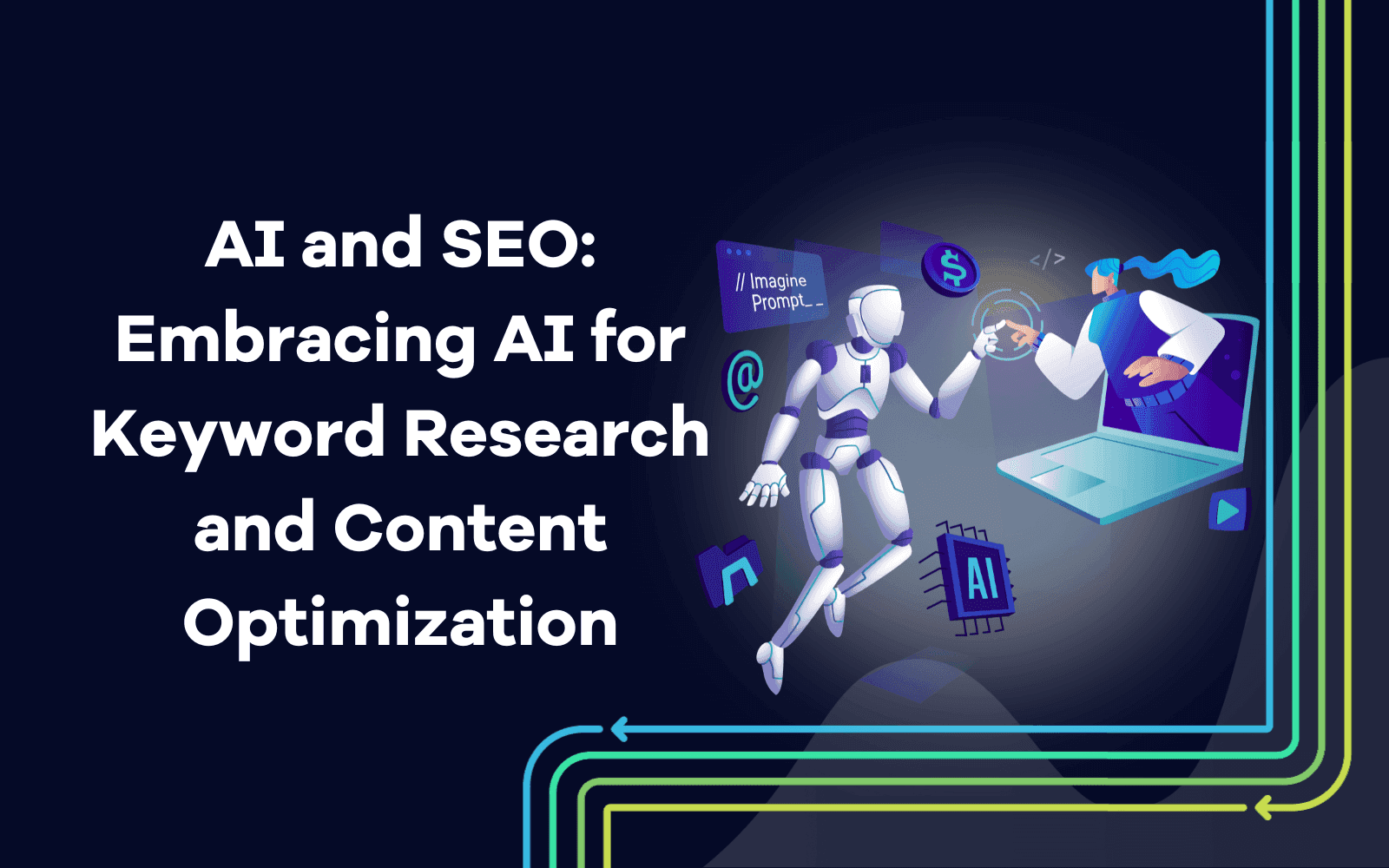
Search engines are continuously refining their algorithms to deliver better results for users. And new technology and tools are further causing the SEO landscape to shift.
One such advancement lately has been Artificial Intelligence, Natural Language Processing, and machine learning tools. AI has opened up new doors for marketers and businesses to get better rankings, increased visibility, and conversions.
In this post, we will explore how AI and SEO can come together to help you take your business to the next level in aspects of SEO.
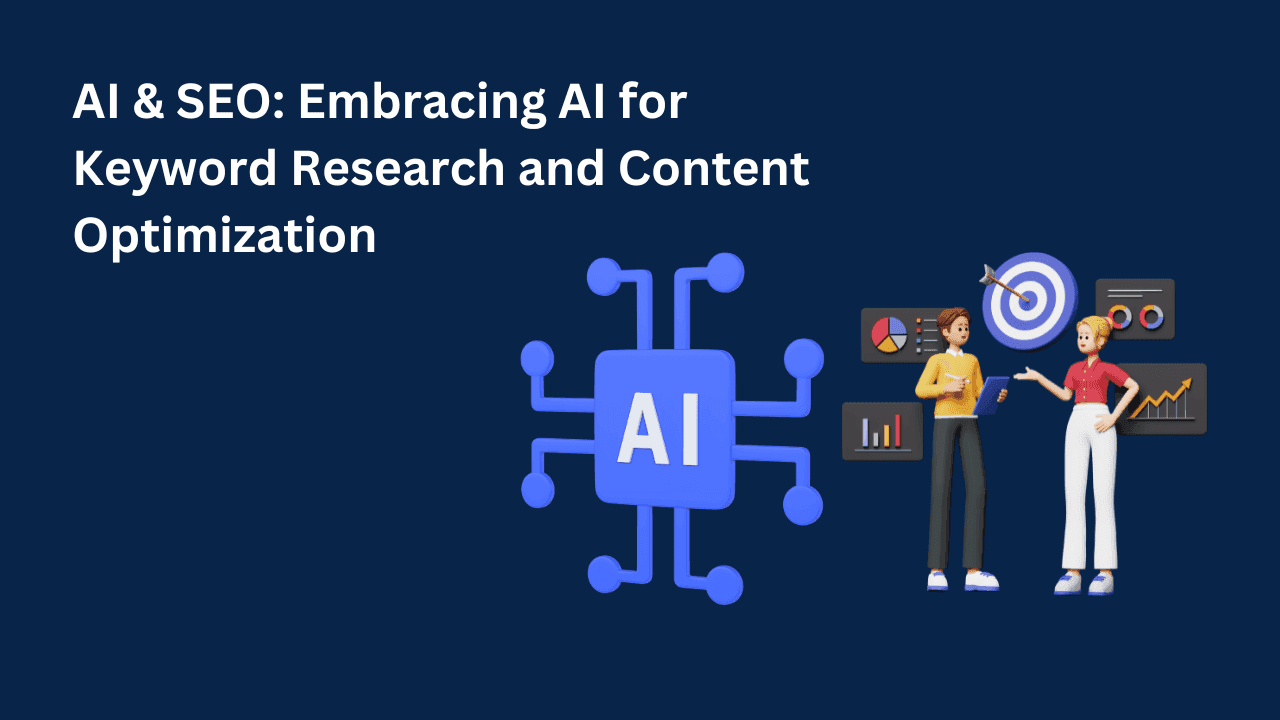
Understanding AI and Machine Learning in SEO
Before we get into the specifics, let’s try to understand what AI and machine learning entail when it comes to SEO.
AI or artificial intelligence refers to the simulation of human intelligence in computers that are able to think and learn like a human.
Machine learning, on the other hand, is a subset of AI and helps computers get better at making decisions over time with experience without being programmed to do so. The experience, in this case, is data, which is used by the computer to learn.
In the context of SEO efforts, AI and machine learning can help you analyze large amounts of data to uncover patterns, automate tasks, and make data-driven decisions to come up with an effective SEO strategy and content creation strategy.
How AI and SEO are Related?
Google’s Rankbrain and BERT algorithms are AI-based solutions that help Google filter search results to provide the best experience for their users.
This means understanding how these algorithms work and what they prioritize will help you come up with better strategies.
Additionally, a big part of SEO is analyzing trends and data about what people are searching for and what is ranking for those keywords.
SEO tools that are powered by AI make this process much easier and provide you with a competitive edge. Some of the key tasks that these tools can help you with are:
- Keyword Research
- SERP analysis
- Content gap analysis
- Content optimization
But we’re only scratching the surface so far. The relationship between AI and SEO goes much further than this. Keep reading to find out!
How AI is Effecting SEO in 2023
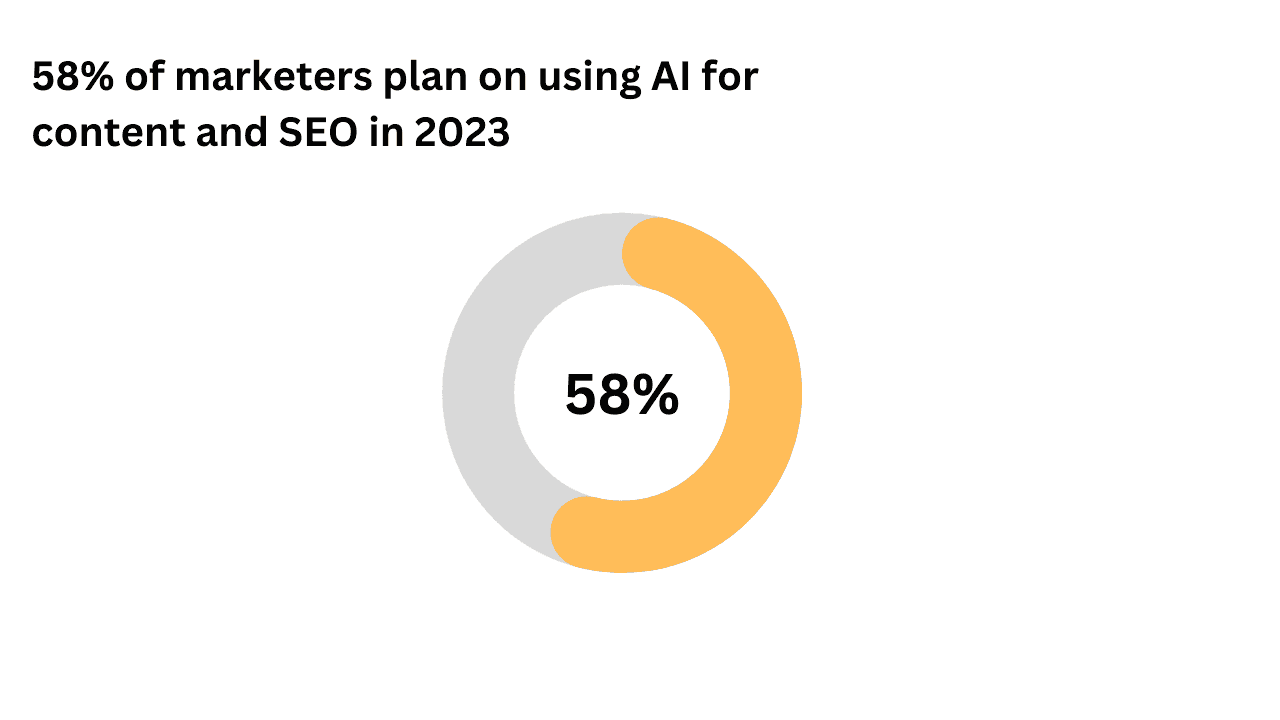
58% of marketers plan on using AI tools to improve their content and SEO.
AI tools like ChatGPT or Dall-E can create content based on prompts entered by users. This means you can create images and blog posts within minutes using these tools.
This results in a few things. A lot more marketers and individuals are publishing content online and they are doing so at a much higher frequency than before.
Does this mean you have more competition now?
Well, yes and no! Although AI content generators do a pretty decent job of creating unique content they are powered by machine learning models. And this means they create new content based on data they have already read.
And where do they get this data? From the internet! So, as more and more AI-generated content gets published on the internet, these content generators use the same content to generate more content.
This means SEO-optimized human-written content is just as valuable as ever. But if you know how to leverage AI to boost your content strategy, it can be a game changer.
The Power of Smart Keyword Research
Good keyword research is the foundation of any successful SEO campaign. AI-driven keyword research methods have revolutionized this process.
Machine learning algorithms can analyze user search behavior, identify long-tail keywords, search volume, and uncover search intent. This allows businesses to target high-value keywords that align with their target audience and niche.
This shows you the importance of good keyword research. When you are building a content plan it is extremely important to target keywords that will get you traffic.
Using AI for keyword research goes much beyond analyzing search data and looking at numbers. You can use tools like ChatGPT to come up with topic clusters to build topical authority.
Here is a technique I like to use:

- Use a tool like Accuranker to find keywords you would like to target.
- Use ChatGPT to find other topics you should write about to gain topical authority.
- Then use your keyword research tool to verify these keywords to decide whether they are worth writing about.
This is just one example of how you can use AI to improve your keyword research. However, there are countless ways to do this.
If you are a marketer, learning how you can leverage such tools to level up your digital marketing game will pay huge dividends.
Content Optimization with AI
High-quality and optimized content is essential for SEO success. There is a ton of content available on the internet and marketers need to make sure their content stands out and resonates with their audience.
Content optimization involves fine-tuning your web pages, blog posts, and other media, so it aligns with the search algorithm and user expectations.
In the past, marketers used to rely on manual research and intuition to optimize their content. AI tools provide you with data-driven insights and allow you to take a more precise approach to content optimization.
Some of the content optimization tasks AI can assist you with are:
Audience Analysis: AI-driven tools can analyze large amounts of data, such as search queries, social media interactions, and website behavior. This can be crucial to gain valuable insights into what content resonates with the audience.
Identifying Content Gaps: AI-powered content analysis tools can also identify gaps in existing content. By comparing competitors, content performance, and engagement, AI tools can help you identify weak points within your content.
Enhancing Readability and Engagement: User experience is critical for SEO. Search engines use metrics like bounce rate and time spent on a page to evaluate content quality. AI can help you improve your content by suggesting changes.
Personalization for Better User Experience: By analyzing user data, AI can help you display dynamic content to provide a more personalized experience for your user. Personalization is great for engagement.
AI, along with other tools has transformed content optimization into a very data-centric and user-centric process.
A majority of marketers are planning on, if not already using AI to help with their SEO strategy.
AI for Writing Content
Although Google says that they are not against AI content, it is recommended to not use AI to generate full blogs/articles.
Google maintains that it will be rewarding high-quality content, regardless of how it is produced. In order to create high-quality content, it is important to understand how Google evaluates content.
Google wants your content to be original, detailed, and able to demonstrate “E-E-A-T”, which means expertise, experience, authoritativeness, and trustworthiness.
Content that is created to be informational and provide value to readers will always be preferred over content generated for the sole purpose of manipulating rankings.
Factors That Affect Your Website’s SEO
Understanding the factors that influence your SEO performance is crucial for building a successful campaign.
The search algorithms are continuously evolving. And user experience and security are gaining tremendous importance. Using AI and data-driven insights can significantly boost your strategy and help you gain better rankings and visibility.
Some of the major elements that have an effect on your website's performance are:
Content Quality and Relevance
High-quality, relevant content may be the most important thing for successful SEO. AI tools can help you create amazing content if used correctly.
You can use AI to research topics and get statistics that add value to your content. Tools like Dall-E and Midjourney are great resources for generating images for your posts as well.
On-Page Optimization
On-page optimization of your content is what makes it easier for the search engine to understand what the content is about.
With AI you can get insights on keyword usage, content structure, and meta tags to optimize your pages for better search visibility.
AI tools can also evaluate the readability and user engagement metrics for your content. This can help you make your content more appealing to readers.
Backlink Profile
A solid backlink profile is the backbone of any successful SEO campaign.
AI tools can help find high-quality link-building opportunities and evaluate the credibility of potential link sources.
Building natural, authoritative backlinks to your website will increase your trustworthiness and domain authority. This will result in better search rankings.
User Experience
User experience (UX) is an essential part of modern SEO.
Search engines track metrics like bounce rates, time spent on site, and user interactions to understand whether your viewers are finding your content useful. The design of your website plays a critical role in how visitors interact with it.
AI analysis of user behavior and preferences lets you optimize your website's UX to help users find what they are looking for easily and quickly.
GDPR Compliance and User Trust
Data privacy of users is a major concern in this day and age.
GDPR (General Data Protection Regulation) compliance is vital for maintaining user trust. Websites that handle user data must comply with GDPR regulations to protect users’ personal information.
AI tools can help you ensure compliance by automating data privacy audits and identifying potential risks with your data handling.
Website Speed
Page load speed directly impacts user satisfaction and search rankings.
AI-powered tools can help you identify potential bottlenecks that may cause your website to slow down. A fast-loading website can help you improve user experience and reduce bounce rates.
Mobile-friendliness
The number of people that surf the internet using mobile phones is increasing every year.
Making sure your website provides a seamless mobile experience is critical nowadays. Similar to the desktop version of your website, AI can provide you insights into where and how you can improve your user experience.
Why Businesses Need SEO
In today’s digital world, SEO has become an integral tool for businesses to gain an online presence.
Often, SEO is only associated with gaining traffic by ranking in search results. This is true to an extent but it can help you drive business through many different avenues.
Businesses are using SEO to their advantage in many ways such as building brand awareness, getting new clients, event marketing, selling products, and much more.
Having a good SEO strategy and getting visibility through Google search is one of the most valuable techniques for growing a business. It can drive millions of dollars in value for your company and should be taken seriously if you are looking to grow.
Final thoughts
AI has been receiving a ton of attention over the last couple of years and rightfully so. The advancements in AI technology have truly disrupted the way people approach marketing.
These days, most marketers are willing to leverage AI for SEO. Tasks that used to take hours, can now be done within minutes. This has been a game changer for the industry and people that aren’t following suit will be left behind.
Embracing AI to enhance your SEO and other marketing efforts is probably one of the best decisions you can take.
With so much noise in the industry, it can be overwhelming but remember, these are still early days and there is lots of time to get on the train. So, take a deep breath and get your hands dirty.
Happy marketing!

Article by:
Utkarsh
Marketer
Utkarsh is the founder of The Lamest Blog, a marketer, and software engineer who leverages his diverse skill set to optimize websites, craft engaging copy, and drive organic traffic. He focuses on user satisfaction and combines his technical expertise and creative flair to deliver exceptional digital experiences.
